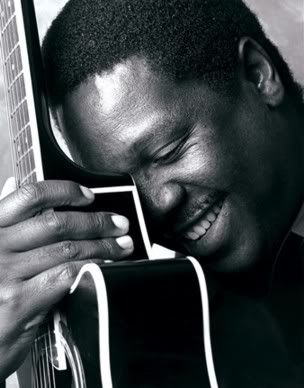Vusi Mahlasela: The "Voice" of South Africa

Vusi Mahlasela’s music captures the unbridled beauty of South Africa... The singular power of his voice and guitar carries his audience into many subtle, ethereal landscapes of Africa's heart and soul. Most of Vusi Mahlasela's life has been dedicated to the struggle to overcome apartheid, but his sound extends far beyond a pedantic political message or one-dimensional rants. The fascinating colors of his musical palate create wonderfully imaginative stories and artistry around the basic facts of social injustice and deprivation in Africa. Vusi came and performed in Denver this summer, and it was an honor to interview him and write this article for the Denver Post. It was also an honor to see just how much one African brother with a guitar and his incredible voice can touch one’s soul.
From his boyhood, when he taught himself how to play guitar with a handmade instrument that he constructed out of fishing line and tin cans, Vusi Mahlasela seemed destined to touch the world with his music. Growing up in Mamelodi Township, just outside of Pretoria, South Africa, Vusi Mahlasela’s talent soon became more than just youthful precociousness or a pleasant pastime. In the tradition of the poet-troubadour, Mahlasela would turn his poetry and music toward the suffering and injustices of apartheid, gradually transforming himself into one of South Africa’s most well-known artists and strongest voices in the anti-apartheid movement. Today Mahlasela’s sound and stage persona is so distinctive that he is known in South Africa as simply, “The Voice.”
In Denver, on June 22, Mahlasela will kick-off a month-long tour of concerts and music festivals in the United States and Europe, culminating with Peter Gabriel’s WOMAD in Reading, England and Les Nuits Atypiques de Langon, in Langon, France. Mahlasela is being brought to Denver by the Swallow Hill Music Association, and will be performing at the First Divine Science Church at 14 and Williams St. in Capitol Hill.
Mahlasela’s summer tour comes fresh off the success of his music in the soundtrack for “Tsotsi,” a South Film that won the Academy Award for Best Foreign Film earlier this year. Beyond winning the Oscar, “Tsotsi” – the story of a young gangster who hijacks a car, only to discover an infant in the back seat – has also won critical acclaim for its music, which introduces the driving force and beat of “kwaito,” South Africa’s homegrown corollary of hip hop. The rebelliousness, linguistic machinations and bravado of kwaito are perfectly complemented by Mahlasela’s spiritual soprano, and deeply emotional, ambient meditations reflecting the conscience of the film. The “Tsotsi” soundtrack also includes “Silang Mabele,” one of Mahlasela’s most popular songs, a traditional African melody about work and grinding corn, which Mahlasela reinvented into a call for the world to work on ending poverty.
With the success of “Tsotsi,” Mahlasela’s music is reaching new audiences all around the world. The exposure has been valuable, as Mahlasela was recently persuaded by his good friend Dave Matthews (who also is South African) to sign with Matthews’ ATO label, giving him new visibility in North America and Europe. In 2003, ATO produced The Voice, a collection of some of Mahlasela’s best work, compiled with an eye toward broadening Mahlasela’s appeal as an international performer.
Mahlasela has been pleased with his involvement with “Tsotsi,” as he works toward a transition from being an anti-apartheid activist to finding new pathways as an artist.
“People know me and my music for instilling hope. There is always something to talk about with the times changing around you and the people around you,” Mashlasela said in a telephone interview from his home in Mamelodi. “But now my music has changed in some ways, because one needs to develop as an artist. I’m not only writing about South Africa but also about the continent of Africa as well.”
Mashlasela explained that some of the music for his new album – which is currently untitled but is due out this fall – is about the historic dispossession of the indigenous San people of Southern Africa, and particularly their oppression by the government of Botswana, which has been accused of destroying their identity and means for survival.
Mahlasela, who is known for a dreamy acoustic sound and subtle African rhythms and blended with deep, resonant vocal harmonies, spoke enthusiastically about his new album. The new project includes collaborations with some of South Africa’s top recording artists, such as Ladysmith Black Mambazo, Hugh Masekela and the Soul Brothers.
“The new album is concentrated on much more than just the acoustic sound of me and my voice. It’s sort of like the songs directed themselves where they wanted to go,” Mahlasela said, adding that the production has generated a lot of “buzz” in South Africa’s music community. “Lately we’ve found there are quite a lot of musicians who want to come and participate. Every song is demanding.”
Mahlasela is developing the new album with his long-time producer, Lloyd Ross. Given the tremendous range of styles, genres and musicians in South Africa, Mahlasela and Ross have learned to work together to find the right artists for different productions, and at times they take their recording equipment into outlying rural communities to capture traditional music and instrumentation.
“Most of the time I know there are certain people I want to work with for the album or on various songs. And maybe Lloyd also will know people who know how to do certain things for a sound that I think should be there,” Mahlasela explained. “If there’s something we’re looking for and I don’t know how to create it, maybe the producer knows and he will have the connection. It develops by working together.”


0 Comments:
Post a Comment
<< Home